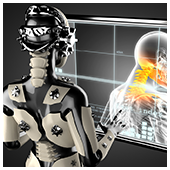 In this day and age, evolving technologies surround and influence people and businesses the world over. Technology has advanced by massive leaps and bounds in recent years, ushering in convenient developments like autonomous self-driving cars. However, in terms of industries for which artificial intelligence (AI) can do the most good, healthcare is at the top of the list. Indeed, self-directed and self-reliant technologies can effect major revolutionary changes upon the healthcare industry.
In this day and age, evolving technologies surround and influence people and businesses the world over. Technology has advanced by massive leaps and bounds in recent years, ushering in convenient developments like autonomous self-driving cars. However, in terms of industries for which artificial intelligence (AI) can do the most good, healthcare is at the top of the list. Indeed, self-directed and self-reliant technologies can effect major revolutionary changes upon the healthcare industry.
Virtual Personal Health Assistants
One of the most easily recognizable manifestations of such a technology is the use of AI as a virtual personal health assistant. This is a recognizable technology because it is essentially already used in everyday life. Siri, Cortana, Alexa, and other virtual personal assistants have already been put to use with smartphones and other devices.
If this existing AI technology could be combined with medical apps for the same devices, healthcare can rise to new levels. These personal assistants can help with mental health, appointment reminders, answering health questions, and medications and refill alerts. They can assist people get the medical care, advice, and tracking they need without putting additional burdens on healthcare professionals that are already stretched thin.
Health Coaching
Another way that artificial intelligence can positively impact healthcare is through its use as a personal health coach. For patients who have chronic conditions, suffer from obesity, or have other long-term healthcare needs, AI health coaching might be the solution that provides continuous support, encouragement, and care. This could include monitoring of vitals and other health information, data analysis, and health advice based on the results.
Healthcare Bots
Bots are also a possibility in the healthcare field. They can be accessible through the internet or via telephone and can provide 24-hour support for scheduling and billing issues. They may also have clinical applications, such as answering questions about medications and treatments. Bots can fill in the gaps when healthcare providers are unavailable, and they can help those providers focus on medical care rather than administrative and billing tasks.
Considering the numerous applications for artificial intelligence in the healthcare industry, it’s apparent that there are so many opportunities, current and future, to incorporate AI into the healthcare field.
Only time will tell if healthcare institutions will integrate this new technology with their clinics and hospitals. Want to discuss whether AI is right for you? Talk to us today to find out.



